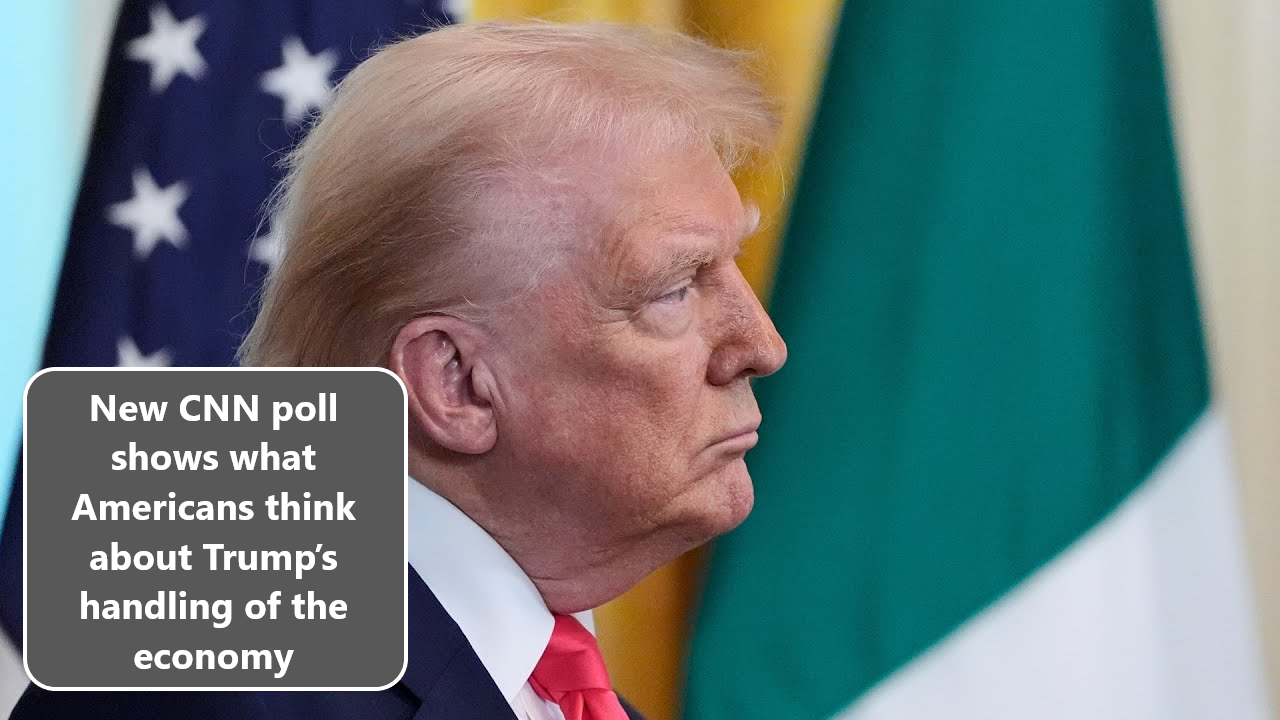The latest CNN poll has revealed insightful data regarding Americans’ opinions on Donald Trump’s handling of the economy during his time in office. The survey highlights key shifts in public sentiment, presenting a picture of how economic policies under the Trump administration have impacted voters and how they view the state of the economy under his leadership. This article delves deep into the findings, offering a comprehensive analysis of what Americans truly think about Trump’s economic strategies, their views on economic recovery, and the future implications for the nation’s economy.
Overview of the CNN Poll: Key Findings
The CNN poll conducted in March 2025 provides a snapshot of how Americans perceive Trump’s economic performance, with specific focus on his handling of key issues like job growth, inflation, and the general economic trajectory. The poll results come at a crucial time as the 2025 election draws closer, with Trump potentially making a return to politics.
Trump’s Economic Legacy: Public Perception
Americans remain deeply divided on the question of whether Trump’s economic policies were beneficial or detrimental to the economy. Here are some key takeaways from the recent CNN survey:
Approval Ratings on Economic Management:
- 40% of Americans expressed approval of Trump’s handling of the economy during his presidency, while 55% disapproved.
- Trump’s approval rating on the economy reached its peak during the initial years of his presidency but saw a sharp decline towards the end of his term.
Impact of Tax Cuts and Job Growth:
- One of the most widely discussed economic policies of Trump’s administration was the Tax Cuts and Jobs Act of 2017. While some Americans credit the tax cuts for stimulating job growth, others argue that the benefits largely went to corporations and the wealthy, leaving middle-class families with minimal gains.
- According to the CNN poll, 51% of Americans believed that the tax cuts benefited the rich, while only 27% felt they helped middle-class workers.
Handling of Inflation and Wages:
- Inflation became a major issue during Trump’s final year in office, contributing to public discontent. The survey showed that 65% of Americans disapproved of Trump’s handling of inflation, with many citing rising costs of goods and services as a major frustration.
- However, some respondents noted that Trump’s policies on deregulation and promoting energy independence helped lower costs in specific industries, such as gasoline prices during certain periods.
Economic Recovery Post-Pandemic:
- The impact of the COVID-19 pandemic significantly altered the economic landscape, and Trump’s role in economic recovery remains a point of debate. According to the poll, 58% of Americans feel that Trump’s pandemic response failed to adequately address the economic challenges brought on by COVID-19.
- On the other hand, 32% of voters believe his economic plans, such as stimulus packages and efforts to reopen the economy, helped mitigate the crisis.
The Economy Under Trump: Key Economic Indicators
To fully understand the public’s opinion, we need to look at the broader economic indicators that shaped the national conversation during Trump’s presidency.
1. Unemployment Rates
One of the Trump administration’s key economic successes was its ability to bring unemployment down to historic lows in the first three years of his presidency. Prior to the pandemic, the unemployment rate had dropped to 3.5%, the lowest it had been in 50 years. However, the pandemic saw job losses spike, and while the recovery was swift in certain sectors, others, particularly service-based industries, took longer to rebound.
Despite these fluctuations, the CNN poll highlights that 49% of Americans still associate Trump with low unemployment levels, while 46% believe his policies exacerbated economic inequality, especially in rural and marginalized communities.
2. Stock Market Performance
Trump often pointed to the stock market as a barometer of economic success during his tenure. The Dow Jones Industrial Average and S&P 500 saw significant growth under Trump, particularly after the tax cuts and deregulation efforts. However, critics argue that the stock market does not accurately represent the economy as a whole, especially when average American families did not see proportional benefits.
According to the CNN poll, 56% of Americans disapproved of the stock market’s performance during Trump’s presidency, while 39% viewed it positively. Many felt that the market’s growth was not reflective of the struggles faced by working-class Americans.
3. National Debt and Deficits
Under Trump, the national debt and federal deficits surged to new highs, raising concerns among economists and lawmakers. Despite promises to reduce the national debt, the Tax Cuts and Jobs Act resulted in $1.5 trillion in lost revenue. Critics argue that this was one of Trump’s most significant economic failures, as it did not deliver the promised growth needed to offset the tax cuts.
The CNN poll shows that 62% of Americans were concerned about the growing national debt, while 33% were more focused on tax reform and economic growth.
4. Trade Wars and Tariffs
Another area where Trump’s economic policies came under scrutiny was his approach to trade relations, especially with China. His tariffs on Chinese goods were designed to bring jobs back to America and protect American industries, but many critics argue that these tariffs led to higher consumer prices and worsened the country’s trade deficit.
46% of Americans expressed disapproval of Trump’s trade war with China, with many feeling that it hurt businesses and led to supply chain issues. However, a portion of his base supports these tariffs, viewing them as a necessary step to challenge China’s unfair trade practices.
What Americans Think About Trump’s Future Economic Policies
As Trump gears up for a potential 2024 presidential run, the CNN poll suggests that public opinion on his economic policies could play a key role in shaping his campaign. Many Americans are still divided on his approach to handling the economy, and his handling of key issues like healthcare, tax reform, and job growth will likely be central to his future political strategy.
In particular, the poll reveals that 55% of Americans want the next president to prioritize economic fairness and job creation, while 35% say that tax cuts for businesses and deregulation should remain a top focus.
Biden’s Economy vs. Trump’s Economy
A critical aspect of the debate surrounding the 2024 elections will be comparing the economic record of Joe Biden with that of Donald Trump. While Biden has focused on increasing government spending to stimulate economic recovery and reduce income inequality, Trump’s supporters argue that his pro-business policies were more effective at generating growth.
The CNN poll shows a stark divide between voters who support Biden’s economic approach and those who align with Trump’s vision. 53% of Biden supporters praised his handling of the economy, while 66% of Trump supporters still view his economic policies favorably.
Table: Key Poll Results on Trump’s Handling of the Economy
| Economic Issue | Approve (%) | Disapprove (%) |
|---|---|---|
| Trump’s Overall Economic Handling | 40% | 55% |
| Tax Cuts for Businesses | 51% | 27% |
| Inflation Management | 35% | 65% |
| Pandemic Economic Recovery | 32% | 58% |
| Unemployment Rates Under Trump | 49% | 46% |
| Stock Market Performance | 39% | 56% |
| National Debt and Deficits | 33% | 62% |
| Trade War with China | 46% | 54% |
Conclusion: The Road Ahead for Trump and America’s Economy
As 2024 approaches, Donald Trump’s economic policies will continue to be a central issue in the American political landscape. The CNN poll paints a complex picture of Trump’s economic legacy, with many Americans divided on whether his approach to handling the economy was beneficial or harmful. While his supporters praise his efforts to stimulate growth and reduce taxes, his critics point to increasing inequality and rising national debt as significant flaws in his economic approach.
Moving forward, Trump will need to address these concerns as he prepares for another potential run at the presidency. Whether or not his economic policies will continue to resonate with voters in 2024 will depend on how well the country recovers from its current challenges and whether his vision for the future resonates with the American public.

Kaish has a BCA degree in Mass Media and over 4 years of experience writing about government schemes, Yojana, recruitment, and the latest educational trends.
